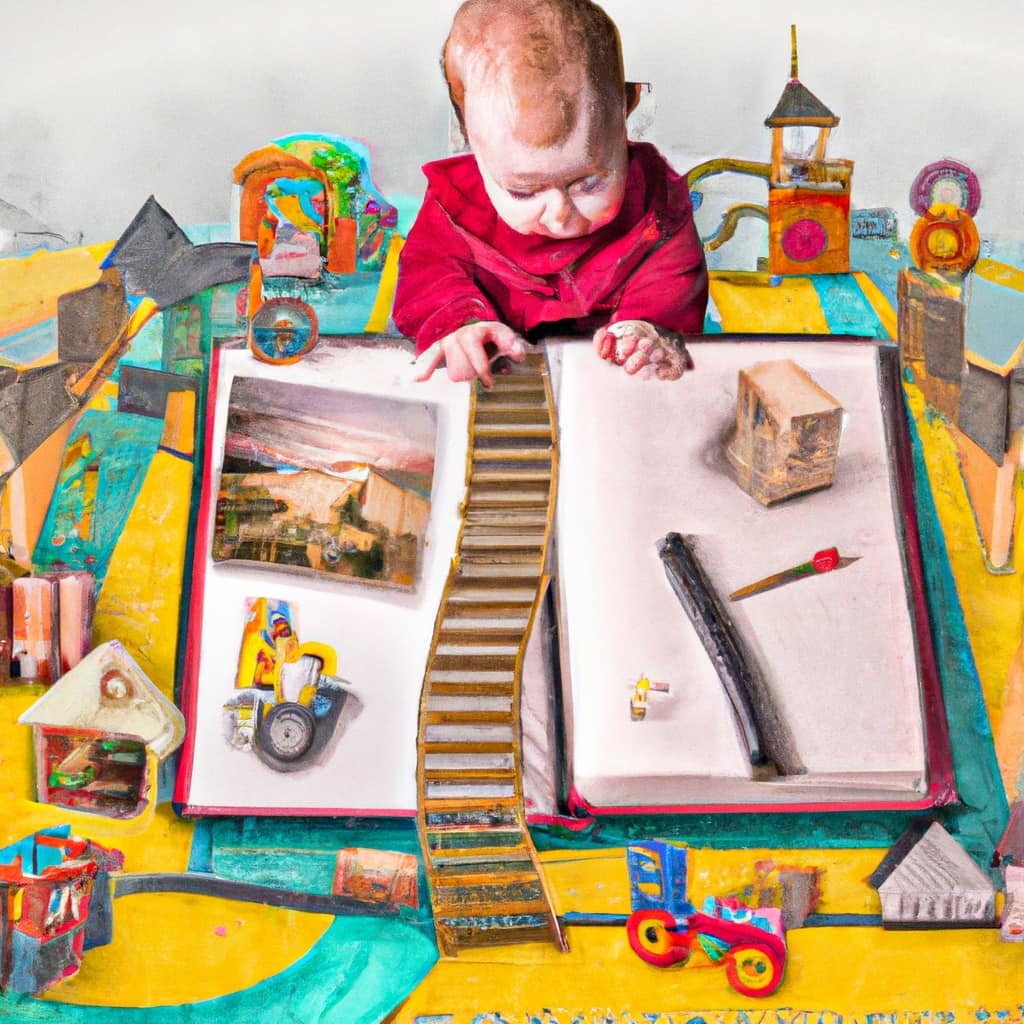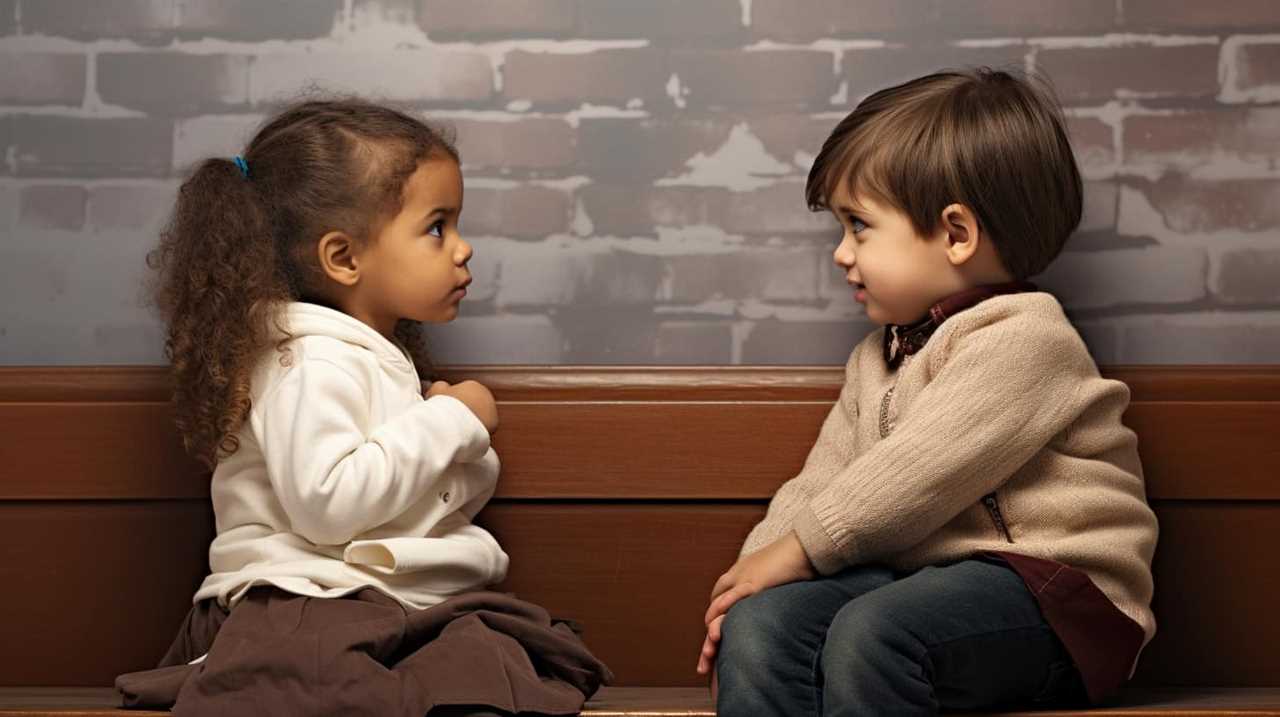As a parent, witnessing my preschool-aged child explore the outdoors and discover its wonders brings me great joy. The fresh air, vibrant colors, and endless opportunities for fun and play are truly energizing.
But outdoor play is not just about fun; it’s also about fostering development and growth.
In this article, we will delve into the benefits of outdoor play for preschoolers, explore different toy options, and discuss important safety considerations.
So let’s lace up our sneakers and dive into the wonderful world of outdoor play!
Key Takeaways
- Outdoor play promotes cognitive development
- Outdoor play stimulates the senses and enhances problem-solving skills
- Outdoor play promotes social skills development
- Outdoor play reduces stress and anxiety in children
The Cognitive Benefits of Outdoor Play
I love how outdoor play promotes cognitive development in preschoolers. It stimulates their problem-solving skills and enhances their cognitive abilities. Research has shown that engaging in outdoor play activities can have a positive impact on a child’s brain development.
When children play outside, they are exposed to a variety of sensory experiences. They can feel the texture of grass, hear the sounds of nature, and see different colors in the environment. These sensory experiences help to activate and strengthen neural connections in the brain, promoting cognitive growth.

Additionally, outdoor play often involves problem-solving tasks. Children have to figure out how to climb a tree or build a sandcastle. These activities challenge children to think critically, make decisions, and find creative solutions. All of these contribute to their cognitive development.
Overall, outdoor play provides a rich and stimulating environment that supports children’s cognitive growth. It helps them develop important thinking skills.
Enhancing Problem-Solving Skills Through Outdoor Play
Enhancing problem-solving skills through outdoor play can be achieved by engaging in activities that require critical thinking and decision-making. Outdoor problem-solving games and activities provide children with opportunities to think creatively, analyze situations, and come up with solutions. These activities not only stimulate their cognitive abilities but also promote teamwork and communication skills.
Here are some examples of problem-solving activities that can be done outdoors:
| Problem Solving Activities | Outdoor Problem Solving Games |
|---|---|
| Scavenger hunts | Escape room challenges |
| Treasure hunts | Outdoor puzzles |
| Team building activities | Obstacle courses |
| Nature exploration | Geocaching |
These activities encourage children to think outside the box, collaborate with others, and develop resilience in the face of challenges. By engaging in outdoor problem-solving games, children can enhance their problem-solving skills while enjoying the benefits of being active and connecting with nature.
Social Skills Development Through Outdoor Play
Engaging in outdoor play can help preschoolers develop essential social skills. Research shows that outdoor play provides opportunities for children to practice empathy and conflict resolution. Here are some ways outdoor play promotes these skills:

-
Empathy:
-
Collaborative activities like building sandcastles or playing team sports help children understand and share the feelings of others.
-
Exploring nature together encourages children to appreciate and show empathy towards living things.
-
Conflict Resolution:
-
Outdoor play often involves negotiation and problem-solving, as children navigate shared play spaces and resources.
-
By engaging in imaginative play, children learn to take on different perspectives and find peaceful resolutions to conflicts.

Reducing Stress and Anxiety Through Outdoor Play
Reducing stress and anxiety through outdoor play allows me to unwind and relax while enjoying the fresh air and natural surroundings. Nature therapy has been shown to have a positive impact on emotional well-being, promoting mental health and relaxation.
Engaging in calming outdoor activities can help alleviate stress and anxiety, providing a sense of peace and tranquility. Whether it’s taking a leisurely walk in a park, practicing yoga in a garden, or simply sitting by a lake and listening to the sounds of nature, outdoor play can be a therapeutic experience.
Connecting with nature and taking time to appreciate the beauty around us can have a profound effect on our overall well-being. So, the next time you feel overwhelmed, consider stepping outside and engaging in some outdoor play for a much-needed dose of relaxation and stress relief.
Fostering Creativity and Imagination Through Outdoor Play
Exploring my surroundings and allowing my imagination to run wild during outdoor play helps me tap into my creativity and discover new possibilities. Outdoor play is a powerful tool for fostering imagination and promoting creative play in preschoolers.
Here are two key ways outdoor play can enhance a child’s creativity:
-
Freedom to explore: Outdoor play provides children with a wide range of stimuli and open-ended opportunities. They can engage with natural elements like trees, rocks, and water, which stimulates their imagination. They can create imaginative worlds, build forts, or pretend to be explorers. The freedom to explore their surroundings in an unstructured way allows children to think creatively and come up with unique ideas.

-
Sensory experiences: Outdoor play engages all the senses, offering a multisensory experience. The different textures, smells, and sounds of nature provide a rich sensory input that sparks children’s creativity. They can touch leaves, listen to birds, or smell flowers, which can inspire imaginative play. Sensory play activities like playing with sand, water, or art materials further enhance a child’s imagination by encouraging them to experiment and express themselves creatively.
Age-Appropriate Outdoor Toy Options
When it comes to choosing outdoor toys for preschoolers, it’s important to consider the materials used and how to prevent choking hazards.
Outdoor toy materials should be non-toxic and durable to ensure the safety and longevity of the toys. Opt for toys with rounded edges and no sharp or protruding parts to minimize the risk of injuries.
It’s also crucial to select toys that are large enough to prevent choking hazards. To further ensure safety, always supervise your child during outdoor play and be ready to intervene if needed.
Ensuring Toy Safety for Outdoor Play
I always prioritize the well-being of my child by ensuring the safety of their outdoor toys. It is crucial to take the necessary steps to ensure that the toys they play with are safe and secure. Here are some important tips to consider when ensuring toy safety for outdoor play:
- Regularly inspect the toys for any signs of wear and tear, such as loose parts or sharp edges.
- Clean the toys regularly to prevent the buildup of dirt and bacteria.
- Store the toys properly after use to protect them from damage caused by weather elements.
- Follow the manufacturer’s guidelines for maintenance and storage of the toys.
- Keep an eye out for any recalls or safety warnings related to the toys your child plays with.
By following these guidelines, you can ensure that your child’s outdoor play equipment remains safe and enjoyable for them to use.

Choosing the Right Outdoor Toy for Your Preschooler
When it comes to choosing the right outdoor toy for your preschooler, there are a few factors to consider. First and foremost, you want to select a toy that promotes active play and physical activity. This will not only keep your child engaged and entertained, but it will also provide numerous benefits for their overall development. Active play helps improve gross motor skills, coordination, and balance. It also enhances cardiovascular health and fosters a love for physical activity from an early age.
To help you make an informed decision, here is a table showcasing some age-appropriate outdoor toy options and the benefits they offer:
| Toy | Age Range | Benefits |
|---|---|---|
| Tricycle | 2-4 years | Enhances balance and coordination |
| Jump rope | 3-5 years | Improves cardiovascular health |
| Mini basketball hoop | 3-6 years | Develops hand-eye coordination |
| Sidewalk chalk | 2-6 years | Encourages creativity and imagination |
Sensory Play and Fine Motor Skills Development
Messy play ideas like sensory bins with water, sand, or cooked spaghetti can promote sensory play and enhance fine motor skills development. It’s amazing how something as simple as playing with water can have such a positive impact on a child’s development.
Here are some ways that water play can benefit your child:
-
Sensory exploration: Water play allows children to explore different textures and temperatures, stimulating their senses and helping them develop a better understanding of the world around them.
-
Hand-eye coordination: Pouring, splashing, and manipulating water requires precise hand movements, helping children improve their hand-eye coordination and fine motor skills.

-
Problem-solving skills: Water play presents children with opportunities to problem-solve, such as figuring out how to make objects float or how to redirect the flow of water.
Frequently Asked Questions
What Are Some Outdoor Play Activities That Can Promote Cognitive Development in Preschoolers?
Outdoor play activities that promote cognitive development in preschoolers include sensory nature walks, playing with puzzles, stacking blocks, throwing and catching balls, and playing with building blocks.
How Can Outdoor Play Enhance Problem-Solving Skills in Preschoolers?
Outdoor play enhances problem-solving skills in preschoolers by providing opportunities for them to navigate challenges, make decisions, and think critically. It fosters creativity, decision-making, and adaptability, all essential skills for problem-solving in their everyday lives.
What Are Some Ways That Outdoor Play Can Promote Social Skills Development in Preschoolers?
Outdoor play can promote social skills development in preschoolers by providing opportunities for cooperation, communication, and problem-solving with peers. It encourages sharing, turn-taking, and empathy, fostering positive interactions and building important social connections.
Can Outdoor Play Help Reduce Stress and Anxiety in Preschoolers? if So, How?
Yes, outdoor play can help reduce stress and anxiety in preschoolers. Spending time outside and connecting with nature has a positive impact on mental health, promoting relaxation and a sense of well-being.
How Does Outdoor Play Encourage Creativity and Imagination in Preschoolers?
Outdoor play encourages creativity and imagination in preschoolers by providing them with opportunities to explore their surroundings, invent new games, and use their imagination to turn ordinary objects into extraordinary playthings.

Conclusion
In conclusion, outdoor play for preschoolers is not only a fun activity but also a crucial part of their development.
Research has shown that outdoor play promotes cognitive development, enhances problem-solving skills, and reduces stress and anxiety in children.
By providing age-appropriate outdoor toys and ensuring their safety, parents and caregivers can further enhance the benefits of outdoor play.
Additionally, engaging in sensory play and fine motor skills activities can help children explore their senses and develop important skills.
So, let us embrace the outdoors and let our little ones thrive in their natural playground.
Remember, as Albert Einstein once said, ‘Play is the highest form of research.’











